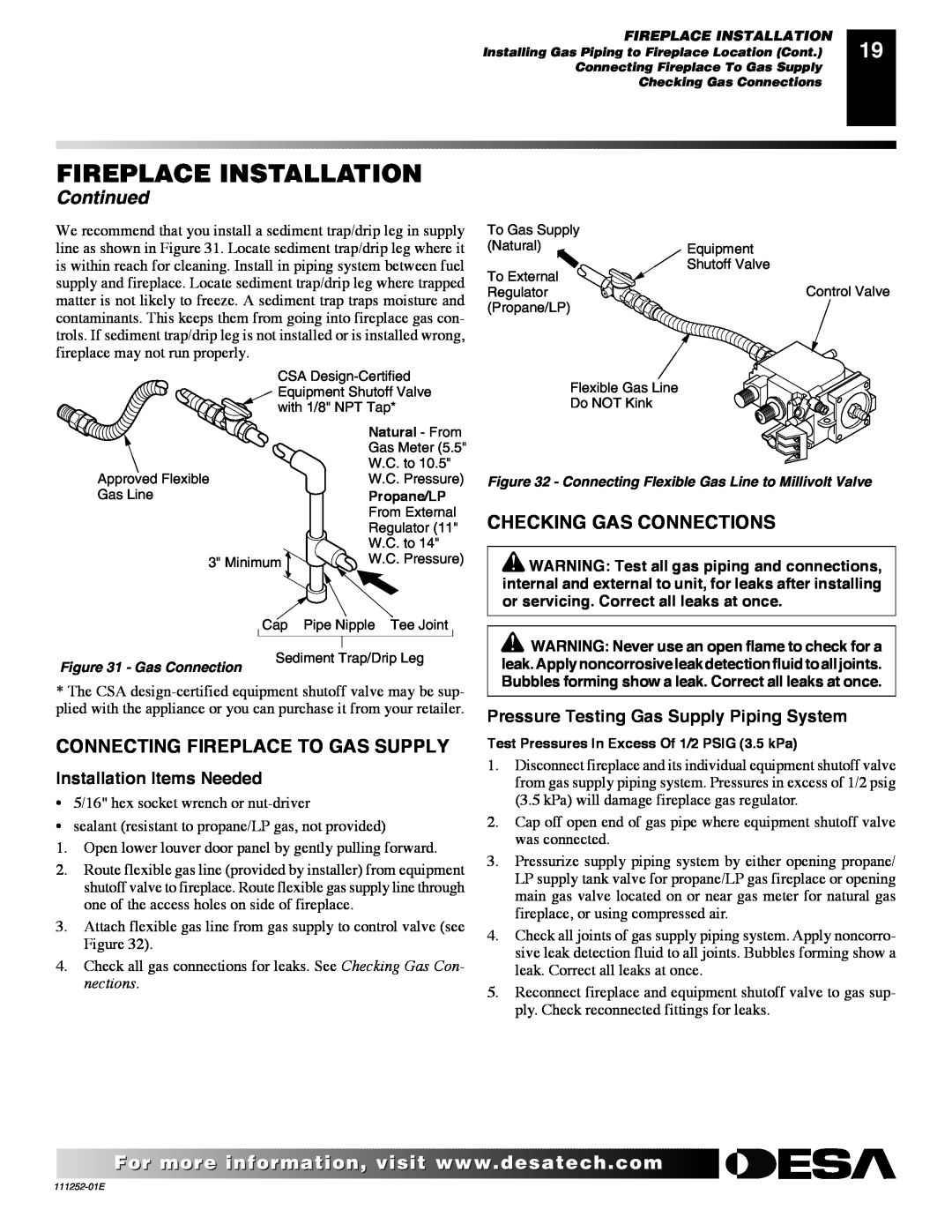
FIREPLACE INSTALLATION
Installing Gas Piping to Fireplace Location (Cont.) Connecting Fireplace To Gas Supply Checking Gas Connections
19
FIREPLACE INSTALLATION
Continued
We recommend that you install a sediment trap/drip leg in supply line as shown in Figure 31. Locate sediment trap/drip leg where it is within reach for cleaning. Install in piping system between fuel supply and fireplace. Locate sediment trap/drip leg where trapped matter is not likely to freeze. A sediment trap traps moisture and contaminants. This keeps them from going into fireplace gas con- trols. If sediment trap/drip leg is not installed or is installed wrong, fireplace may not run properly.
CSA
![]() Equipment Shutoff Valve
Equipment Shutoff Valve
with 1/8" NPT Tap*
To Gas Supply
(Natural)Equipment
Shutoff Valve
To External | Control Valve |
Regulator | |
(Propane/LP) |
|
Flexible Gas Line
Do NOT Kink
Approved Flexible
Gas Line
3" Minimum ![]()
Natural - From Gas Meter (5.5" W.C. to 10.5"
W.C. Pressure)
Propane/LP From External Regulator (11" W.C. to 14" W.C. Pressure)
Figure 32 - Connecting Flexible Gas Line to Millivolt Valve
CHECKING GAS CONNECTIONS
![]() WARNING: Test all gas piping and connections, internal and external to unit, for leaks after installing or servicing. Correct all leaks at once.
WARNING: Test all gas piping and connections, internal and external to unit, for leaks after installing or servicing. Correct all leaks at once.
Cap Pipe Nipple Tee Joint
Figure 31 - Gas Connection
Sediment Trap/Drip Leg
![]() WARNING: Never use an open flame to check for a leak.Applynoncorrosiveleakdetectionfluidtoalljoints. Bubbles forming show a leak. Correct all leaks at once.
WARNING: Never use an open flame to check for a leak.Applynoncorrosiveleakdetectionfluidtoalljoints. Bubbles forming show a leak. Correct all leaks at once.
*The CSA
CONNECTING FIREPLACE TO GAS SUPPLY
Installation Items Needed
•5/16" hex socket wrench or
•sealant (resistant to propane/LP gas, not provided)
1.Open lower louver door panel by gently pulling forward.
2.Route flexible gas line (provided by installer) from equipment shutoff valve to fireplace. Route flexible gas supply line through one of the access holes on side of fireplace.
3.Attach flexible gas line from gas supply to control valve (see Figure 32).
4.Check all gas connections for leaks. See Checking Gas Con- nections.
Pressure Testing Gas Supply Piping System
Test Pressures In Excess Of 1/2 PSIG (3.5 kPa)
1.Disconnect fireplace and its individual equipment shutoff valve from gas supply piping system. Pressures in excess of 1/2 psig (3.5 kPa) will damage fireplace gas regulator.
2.Cap off open end of gas pipe where equipment shutoff valve was connected.
3.Pressurize supply piping system by either opening propane/ LP supply tank valve for propane/LP gas fireplace or opening main gas valve located on or near gas meter for natural gas fireplace, or using compressed air.
4.Check all joints of gas supply piping system. Apply noncorro- sive leak detection fluid to all joints. Bubbles forming show a leak. Correct all leaks at once.
5.Reconnect fireplace and equipment shutoff valve to gas sup- ply. Check reconnected fittings for leaks.
![]() For more
For more![]()
![]()
![]() visit www.
visit www.![]()
![]()
![]() .com
.com![]()
![]()
![]()
![]()
![]()
![]()
